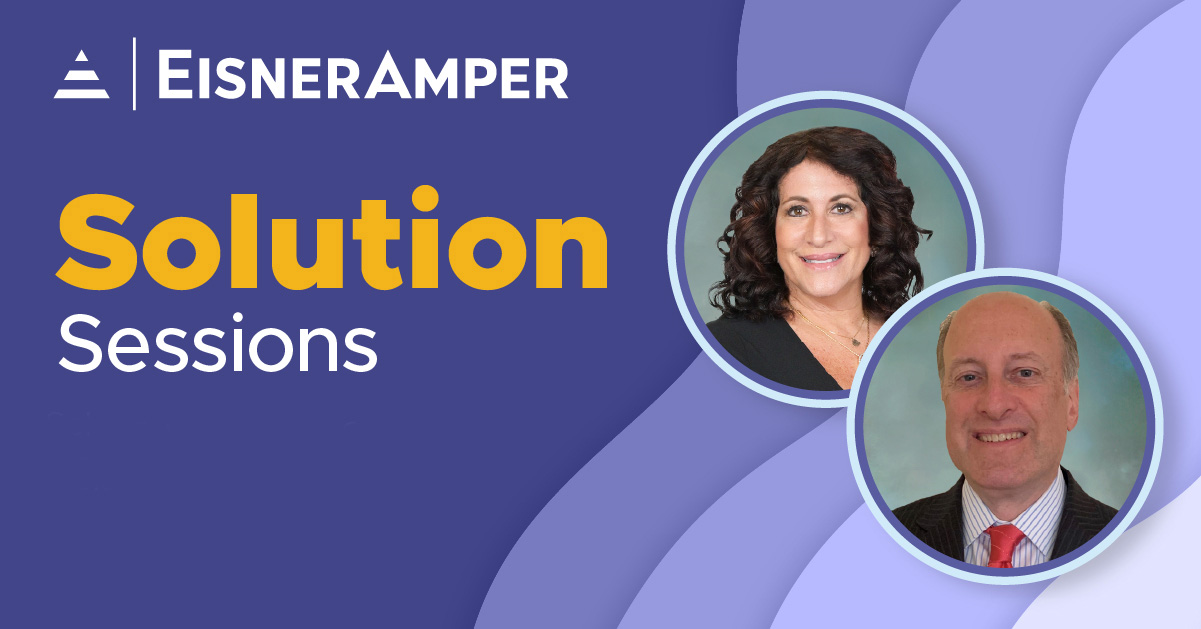
Employee Benefits That Are on the Fringe
- Published
- Aug 21, 2019
- Share
You’ve heard of employee benefits like 401(k)s, life insurance, and paid vacation time. But with changing demographics and technologies, companies are looking at alternative types of benefits to attract and retain talent. EisnerAmper business advisor Tim Schuster examines what some of these are, who’s using them, and if they’re having the desired result.
Transcript
Dave Plaskow: Hello and welcome to “The Bottom Line.” This podcast examines the everyday business and finance issues faced by closely held and private businesses. We hope to provide you with news you can use in what we'd like to think of as a jargon-free zone. I'm your host, Dave Plaskow, and with us is Tim Schuster, a manager in EisnerAmper’s Private Business Services Group. Today we'll discuss with Tim some less-common fringe benefits companies are offering to attract and retain employees. Hey Tim.
Tim Schuster: Hey Dave, how are you?
DP: Great. Tim, in our last podcast we touched on some fringe benefits that companies might offer their employees. Remind our listeners of some of the more common ones.
TS: Of course. Some that come to mind are paid time off, retirement plan contributions, education assistance, and various insurances such as health and life.
DP: So those are the tried-and-true ones. But as they shift and as demographics and technology change, we're seeing some less run- of-the-mill benefits being offered.
TS:We truly are. I'll highlight a bunch that have caught my eye, but a total list can actually be much longer. The first one is paid, paid vacation. Yes. You heard that correct. It's paid, paid vacation, where employers put some money away toward a vacation that's forcing you to actually take time off.
DP: Or as I like to call it - paid squared.
TS: Exactly! I like that. Another one is a meal delivery membership and. This is for anyone who doesn't like to cook: people like cord cutters, Millennials and the younger guys; paying for subscriptions like Netflix, Hulu or even Amazon prime. If you're in a city, there could be an offering of Uber or Lyft credits. I mean this is pretty simple, right? You could give everyone off on their birthday. It doesn't cost you anything. Dry cleaning services, paying for house cleaning services. Believe it or not, that's actually a big thing as well. Many people just don’t have the time to clean their houses as much anymore. So if you're paying for a service, these are great. Have them come in and help. And the last one is helping to pay for some student loan assistance. And just as an item of note, the big thing here is, some of these fringe benefits can be taxable. So please, please discuss any of these with your trusted advisor before your business implements.
DP:Okay, good point. So a lot of these seem to be tech oriented, experiential benefits, time savers, not so much material things.
TS:Correct. In all honesty, really where a lot of this is stemming from is from the tech companies. They're trying to attract Millennial and Gen Z talent, and they're offering these as a “2.0 incentive,” per se. So a common question I actually receive from my clients is what can I offer to hire and retain younger employees? And these are some of the options I'd give to them.
DP:So just to put it in perspective, out of every, say 10 clients you talk to, how many bring this up?
TS:I would say 7 out of 10. Any client I have that has an aging population, one of the big areas that they're trying to manage is get, collect and retain talent.
DP: Does it work?
TS: It actually does work to a degree, and it all depends upon a client's location. An area where we are recording right now, we're in a very urban suburban area, so you have very easy access to New York and Philly. So it's easier to acquire that talent. But if you're in a rural area, maybe upstate New York or in central Pennsylvania, it would be a little bit more difficult to acquire it. We would tweak this a bit, but to a degree you could still be offering some incentive programs similar to these.
DP:Okay. So again, experiential type of situation. Switching gears a little bit, why don't you give us one of your New Jersey Historical Society fun facts?
TS: It would be my pleasure. So this is actually more of a United States fun fact, but did you know our Independence Day is actually not July 4? It’s July 2. The Second Continental Congress in Philly voted to approve the resolution of independence on July 2. July 4th was when the final wording of the Declaration of Independence was approved and is the agreed upon date of independence.
DP:Works for me. Well thanks again, Tim, for all the info. And thank you for listening to “The Bottom Line” as part of the EisnerAmper podcast series. If you have any questions or there's a topic you'd like us to cover, email us at contact@eisneramper.com. Visit eisneramper.com for more information on this and a host of other topics, and join us for our next EisnerAmper podcast when we get down to business.
Also Available On
What's on Your Mind?
Start a conversation with Timothy
Receive the latest business insights, analysis, and perspectives from EisnerAmper professionals.











